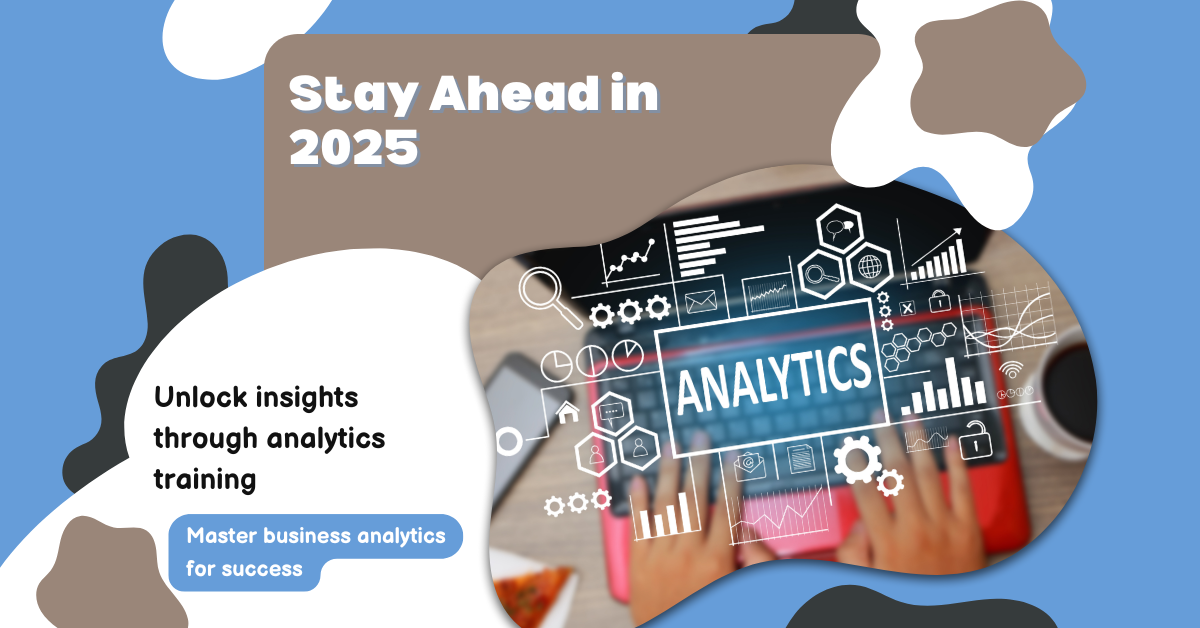
Stay Ahead in 2025: The Rising Importance of Business Analytics Training
#1 Myinstitutes.com is one of the best educational portals and training institutes in MYSORE, MANGALORE, and BANGALORE.
Stay Ahead in 2025: The Rising Importance of Business Analytics Training
Why Business Analytics Training Matters in 2025
In the rapidly evolving business landscape of 2025, data is more than just numbers—it’s a strategic asset that drives decision-making, innovation, and competitive advantage. As businesses continue to undergo digital transformation, they are generating and collecting data at unprecedented rates. From customer interactions and financial transactions to supply chain metrics and social media trends, data has become the lifeblood of modern enterprises. However, the true value of data lies not in its mere collection but in its interpretation and application. This is where Business Analytics training becomes crucial.
The Increasing Significance of Data-Driven Decision Making
In 2025, organizations are increasingly adopting data-driven approaches to make well-informed decisions. Whether it’s predicting customer preferences, optimizing supply chains, or enhancing marketing strategies, data analytics provides the insights necessary for strategic planning. Business analytics training empowers professionals to analyze vast and complex data sets, identify patterns, and transform raw data into actionable insights.
Businesses are no longer relying on intuition or past experiences alone. Instead, they are leveraging data analytics to minimize risks and make objective choices. This shift toward data-centric decision-making is seen across industries, from finance and healthcare to retail and manufacturing. Consequently, there is a growing demand for professionals who possess not only analytical skills but also the ability to communicate data-driven insights effectively.
The Role of Technology in Business Analytics
In 2025, advanced technologies such as Artificial Intelligence (AI), Machine Learning (ML), and Big Data are reshaping the Business Analytics landscape. These technologies enhance the ability to process large volumes of data, enabling businesses to make faster and more accurate predictions.
- Artificial Intelligence and Machine Learning: AI and ML are at the forefront of modern business analytics. They allow for predictive and prescriptive analytics, helping organizations forecast trends and make proactive decisions. Business analytics training now includes modules on leveraging AI-driven tools to perform tasks like customer segmentation, demand forecasting, and sentiment analysis.
- Big Data Analytics: The sheer volume of data generated daily requires robust processing capabilities. Big data analytics techniques, such as Hadoop and Apache Spark, help manage and analyze massive data sets efficiently. Professionals trained in these technologies can identify patterns and correlations that were previously too complex to detect.
- Data Visualization Tools: Presenting complex data in a visually appealing and easily understandable format is essential. Tools like Tableau, Power BI, and Google Data Studio are integral to modern analytics training, as they enable professionals to create interactive and insightful dashboards. Visualization skills make it easier for stakeholders to grasp critical insights, facilitating better decision-making.
Bridging the Skills Gap with Business Analytics Training
Despite the booming demand for data professionals, many companies still face a skills gap. They struggle to find candidates proficient in data analysis, visualization, and interpretation. Business analytics training addresses this gap by providing comprehensive education in statistical analysis, data mining, and advanced analytical techniques.
In 2025, Business Analytics Training programs emphasize hands-on experience. Learners engage in practical projects, work with real-world data, and develop problem-solving skills. Courses are designed to teach the entire data pipeline, from data collection and cleaning to analysis and reporting. Additionally, training often includes modules on soft skills, such as data storytelling and presenting insights to non-technical audiences.
Professional certifications in business analytics add significant value to one’s resume. Employers recognize the commitment to mastering analytics tools and techniques, and certified professionals are often given preference during recruitment. Leading institutions now offer specialized courses focusing on industry-specific analytics, making professionals more versatile and valuable.
Career Opportunities and Industry Impact
Business analytics training opens doors to numerous high-paying career opportunities. As companies continue to digitalize, the need for data-literate professionals has never been greater. Some of the most sought-after roles include:
- Data Analyst: Analyzing data to identify trends, patterns, and insights.
- Business Intelligence Analyst: Developing data-driven solutions and creating dashboards to support business decisions.
- Data Scientist: Applying machine learning algorithms and statistical methods to forecast outcomes.
- Operations Analyst: Streamlining business processes and improving efficiency through data analysis.
- Marketing Analyst: Measuring campaign performance and customer behavior to optimize strategies.
Industries such as finance, healthcare, e-commerce, and supply chain management particularly benefit from data analytics. For example, in healthcare, analytics is used to predict patient outcomes and optimize treatment plans. In finance, it helps identify investment opportunities and assess risks. The versatility of analytics skills means that trained professionals can transition between industries with relative ease.
Future-Proof Your Career with Analytics Skills
Investing in business analytics training in 2025 is a strategic career move. As organizations become increasingly data-driven, professionals who can translate data into insights will be in high demand. Training not only hones technical skills but also fosters critical thinking, problem-solving, and data storytelling abilities.
Moreover, the ability to work with data makes professionals more adaptable in a rapidly changing job market. As automation and AI continue to reshape industries, those equipped with analytical skills are better positioned to thrive. Continuous learning and staying updated with the latest analytical techniques ensure long-term career relevance and growth.
Conclusion
Staying ahead in 2025 requires embracing the power of business analytics. As data becomes more central to business strategies, the skills to analyze and interpret data effectively will differentiate successful professionals from the rest. By investing in comprehensive Business Analytics Training, you secure a competitive edge and pave the way for a dynamic and future-ready career.
Top 5 Android App Development Courses in Bangalore
- Myinstitutes
- Apponix Technologies
- Inventateq
- Besant Technologies
- FITA Academy



